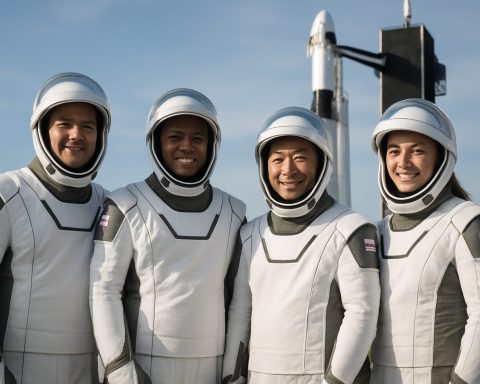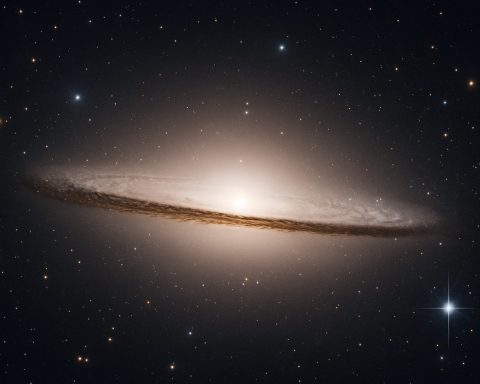- Edwin Hubble’s discovery of the Andromeda nebula’s distance challenged the belief that the Milky Way encompassed the entire universe.
- Before Hubble, astronomers like Shapley and Curtis debated the nature of spiral nebulae and whether they were part of the Milky Way or separate galaxies.
- Hubble utilized the Hooker 100-inch telescope and Henrietta Swan Leavitt’s work on Cepheid variables to determine that Andromeda is in fact a separate galaxy.
- Hubble’s observations of redshifted galaxies revealed that the universe is expanding, suggesting a dynamic and vast cosmos.
- Hubble’s contributions significantly transformed our understanding of the universe and highlighted the potential of human curiosity and scientific exploration.
A century ago, Edwin Hubble punctured the velvet curtain of the night sky, revealing a universe far grander than humanity ever imagined. In a space brimming with mystery, he discerned that the Andromeda nebula, a beacon of light admired by stargazers for centuries, lay far beyond the confines of our own Milky Way—a staggering 2.5 million light-years distant. This revelation shattered the age-old belief that our galaxy was the entirety of the cosmos.
For centuries, astronomers grappled with the nature of nebulae, those wispy patches of light decorating the heavens. Galileo’s telescope in 1610 unveiled a cosmic sea of stars within the Milky Way, but it took centuries more to challenge the notion that all celestial wonders were nestled within our galaxy. The debate culminated in 1920 when scientific titans Shapley and Curtis squared off, neither conclusively proving whether spiral nebulae were mere galactic structures or independent “island universes.”
Enter Edwin Hubble, armed with the mighty Hooker 100-inch telescope atop Mount Wilson. He leveraged the meticulous work of Henrietta Swan Leavitt, who had unveiled the secret of Cepheid variables—stars whose brightness pulsates rhythmically, offering cosmic yardsticks to measure vast distances. Hubble spent countless nights peering into the cosmos, diving into photographic plates to pluck out Cepheids in M31, deeming it an “island universe” unto itself.
Just when the dust seemed to settle, Hubble further unraveled the vastness by observing that galaxies were not static. Their spectra, redshifted like the fading tail lights of retreating cars, painted a story of an ever-expanding cosmic ballet. The universe was not just larger; it was alive and in motion—a dizzying dance of galaxies stretching into the infinite.
Edwin Hubble’s legacy is not just in the stars—it’s a reminder of human potential to illuminate the dark unknown and transform our understanding of existence itself.
Journey Beyond the Milky Way: How One Man Reshaped Our Cosmic Perspective
How-To Steps & Life Hacks
How to Observe Distant Galaxies
1. Get the Right Equipment: A telescope with at least an 8-inch aperture will allow amateur astronomers to view distant galaxies.
2. Choose a Dark Location: Light pollution can obscure your view. Find a spot with minimal artificial light.
3. Use Star Maps: Tools like Stellarium or SkySafari can help you navigate the night sky to find galaxies.
4. Photograph Your Observations: Attach a DSLR camera to your telescope to capture long-exposure shots.
Real-World Use Cases
Applications of Hubble’s Discoveries
– Astronomy Education: Hubble’s findings are foundational in teaching the scale and expansion of the universe.
– Scientific Research: Studies of redshifts support ongoing research in dark energy and the Big Bang theory.
Market Forecasts & Industry Trends
The Future of Telescopic Technology
– Rise of Space Telescopes: With the James Webb Space Telescope on the rise, expect further breakthroughs in understanding the universe.
– Personal Observatory Systems: As technology becomes more accessible, amateur astronomers may gain tools akin to mini observatories at home.
Reviews & Comparisons
Comparing Ground-Based and Space-Based Telescopes
– Ground-Based Plus: Larger, upgradeable, less expensive.
– Space-Based Plus: Unobstructed by Earth’s atmosphere, allowing clearer and more detailed observations.
Controversies & Limitations
Challenges Before Hubble’s Revelations
– Human Perception: Before Hubble, limitations in technology skewed humanity’s understanding of the cosmos.
– Measurement Errors: Early measurements of celestial distances often varied, leading to heated scientific debates.
Security & Sustainability
The Environmental Impact of Astronomy
– Light Pollution: Efforts continue to adopt darker sky initiatives to preserve night skies for scientific observation.
– Sustainable Practices: Astronomical institutions are adopting sustainable practices to minimize their environmental footprint.
Insights & Predictions
The Expanding Universe: What’s Next?
– Dark Energy Research: Exploration into the force driving cosmic expansion is a priority.
– Potential Multiverses: Some researchers are investigating whether multiple universes could exist beyond our own.
Pros & Cons Overview
Benefits and Drawbacks of Hubble’s Discoveries
– Pros: Revolutionized our understanding of the universe, provided evidence for the Big Bang theory.
– Cons: Redshift measurements are complex and can lead to misinterpretations without precise calibration.
Quick Tips for Stargazers
– Utilize Apps: Mobile applications can provide real-time data and maps for star and galaxy observation.
– Join a Community: Consider joining astronomy clubs for access to better equipment and shared knowledge.
For more on telescopes and space exploration, visit Nasa.
These insights into Hubble’s contributions to astronomy show us not only the radical nature of his discoveries but also their far-reaching implications for science and our understanding of the universe.










